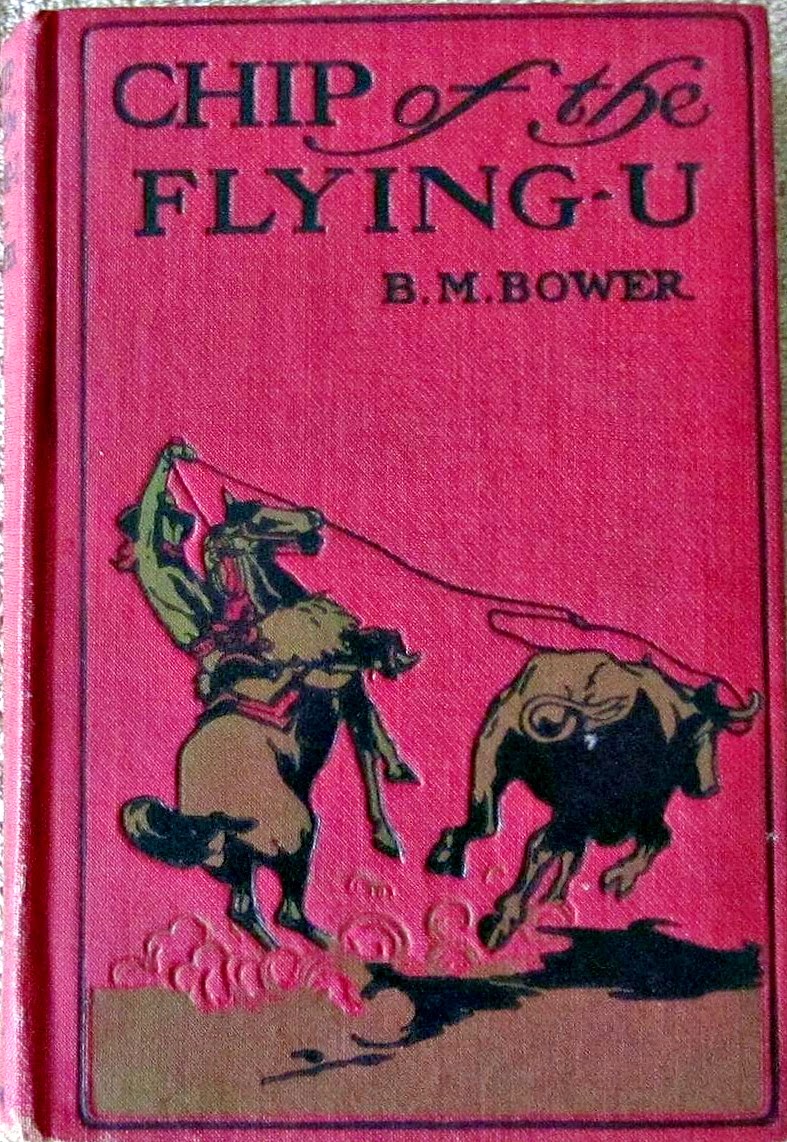 Original Publication Date: 1906
Original Publication Date: 1906Genre: western
Topics: Love, belonging, nature, art
Review by heidenkind:
When Della Whittemore moves to her brother's Montana ranch, The Flying U, Chip and the rest of the hands aren't expecting much. Chip specifically predicts she'll either be a prissy “sweet young thing”, an annoying cowgirl, or an old maid who wants to drag him to church. But Della immediately surprises him and earns the respect of Chip and the other ranch hands with her quick wit and easy-going nature. Now all that's left is for Chip to man up and admit his feelings for her.
I tend to avoid westerns. I read one Louis L'Amour when I was a kid, and the only thing I remember about it is that it was distinctly unmemorable. There are hardly ever any women in westerns, either, and when they are in them they demonstrate an alarming tendency to be kidnapped by Indians. It's just not my thing. But when I asked for romance novel rec's in Melody's Public Domain Google Group, Chip of the Flying U came highly recommended and I decided to give it the barest briefest hint of a try, just in case it didn't suck. Well, it absolutely didn't–Chip of the Flying U grabbed me in the first chapter. It was so much fun that I slowed down reading it when I got near the end, to drag the story out as long as possible.
First of all, BM Bower is a really good writer. She's very much with the show-and-not-tell. For example, by the end of the first chapter we know The Flying U ranch hands have a deep appreciation of irony. Shorty's not short and Happy Jack is morose–something's that inferred through dialog, not exposition.
And speaking of the ranch hands, the real strength of Chip of the Flying U are the quirky western characters, like JG Whittemore's housekeeper, the Countess, who constantly speaks in aphorisms; the pretentious Dunk; and of course the "Little Doctor" herself, Della.
But my favorite character is Chip! He's so well-drawn and layered: a combination of smart, snarky, defensive, and sensitive that's absolutely irresistible. But most of all I loved the fact that he's clearly based off the famous painter, "the cowboy genius" Charles M. Russell. Let's do a quick comparison, shall we?
- Chip has no formal art training and has always enjoyed sketching. Ditto Charlie Russell.
- Chip's paintings are based on his life as a ranch hand in Montana. Charlie Russell's paintings were based on his life as a cowboy in Montana.
- The first painting by Chip that captures public acclaim is titled "The Last Stand," which shows, "A poor, half-starved range cow with her calf which the round-up had overlooked in the fall, stood at bay against a steep cut [snow]bank. Before them squatted five great, gaunt wolves intent upon fresh beef for their supper." The first work by Charlie Russell that captured public attention was "Waiting for a Chinook," which shows an emaciated cow in the snow surrounded by hungry wolves. In both cases, the painting was of something the artist saw himself.
- Chip's nickname before he came to The Flying U was Kid. Russell's nickname when he was a cowboy was Kid Russell.
- Chip signs his work with a "brand," or glyph, and his name. Russell famously signed his work with a buffalo head brand and either his initials or his name.
- Finally, it's Della who pushes Chip to show others his work and sell his paintings because she believes in his talent. Likewise, it was Russell's wife, Nancy, who pushed Russell to charge high prices for his work and managed his career. "[S]uccess came tapping at the [Russells’] door or, rather, Nancy dragged success in, hog-tied and branded," the Russells' nephew once said.
So that was fun! But even without those references, Chip of the Flying U was a really good read. It can be classified as a romance–and the relationship arc between Chip and Della is really well-done–but it's more of a coming of age story for both the main characters. Della grows into her role as a doctor and Chip discovers his true talent. In between, there are round-ups, western dances, ranch hijinks, and a horse named Silver is saved.
I definitely recommend Chip of the Flying U if you're in the mood for a fast, entertaining, and well-written read.
Download Chip of the Flying U by BM Bower at Project Gutenberg|Librivox



.jpg)
















